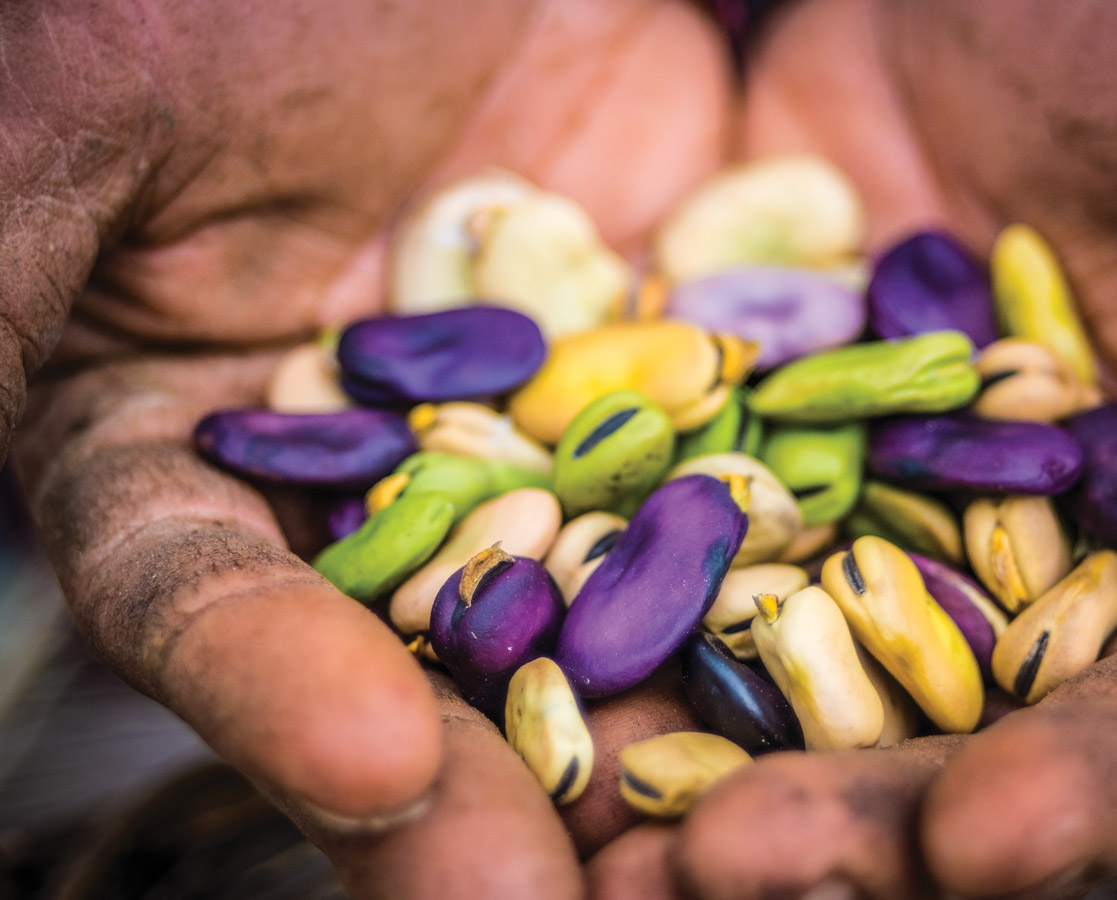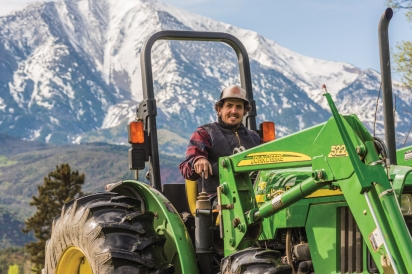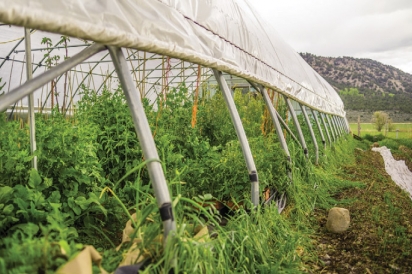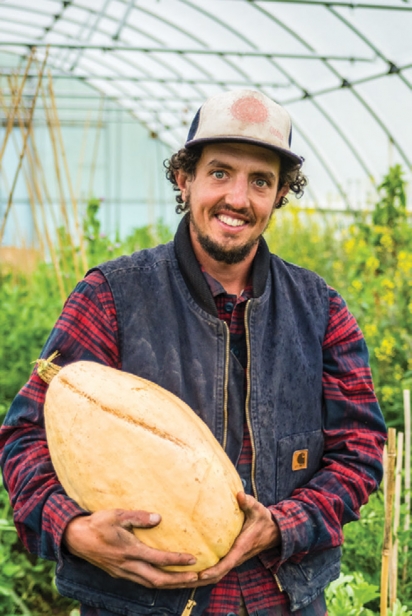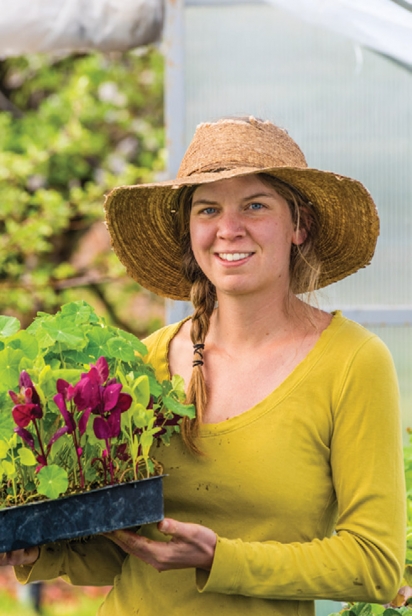The Seeds of Intent
A YOUNG CARBONDALE FARMER CULTIVATES A PASSION FOR BREEDING HIGH ALTITUDE CROPS
Casey Piscura strides through the false dusk. Behind him, Assignation Ridge shoulders the dropping sun; eastward, residual light floods the Crystal River Valley. Hundreds of 15-inch stake flags sprout in his wake because the 31-year-old co-owner of Wild Mountain Seeds is planning a significant expansion on the 1.5-acre plot he leases from Carbondale rancher Jason Sewell. Piscura’s plans are just as big: Flood irrigation here. Rows of fruit trees there. In between, alleyways of large-scale crops.
Despite the audacity of breaking fallow ground on such a scale, Piscura’s contentment is palpable. What started four years ago as a used hoop house and a dream is now a reputable, financially viable farm. For a “landless” farmer, Piscura’s vision and commitment are grand.
Putting down roots
After earning a degree in crop and soil environmental science from Virginia Tech, the southwestern Virginia native moved to Colorado in 2007, seeking mountains and adventure. Upon arriving in the Roaring Fork Valley with life/business partner Kirsten Keenan, Piscura discovered that many retiring farmers and ranchers are eager to lease land to young agriculturalists, in order to keep it in production.
After meeting Sewell—of Carbondale’s historic 1,200-acre Sunfire Ranch—Piscura signed a 10- year land lease. Settled in 1893, Sunfire is the oldest continuously held property in Pitkin County. As a fifth-generation rancher, Sewell is savvy enough to embrace paradigm shift s in agriculture, and supports Piscura “wholeheartedly,” he says. “I feel very fortunate that we found each other. He’s been an integral part of my [leap] into holistic management, and my personal growth as a rancher.” Says Piscura, “It’s a ‘win-win-win’ situation.”
Wild Mountain Seeds now boasts a 40-member CSA and sells produce at local farmers’ markets and valley restaurants including Cache Cache, Pine Creek Cookhouse, Town, Free Range Kitchen, Pan & Fork, Silo and Rustique. Piscura’s passion, however, is developing, saving and marketing regionally adapted seeds.
The farm’s reputation has been solidified by his seed methodology and cultivation of “landrace” crops—a term for genetics from a collection of varieties unique to a specific geographic region. Pulling a dirt-smeared sheet from a pile of field notes, Piscura reveals a page dense with dates, traits and seed accessions (the population of seeds harvested from a collection of plants). “It’s incredible,” he says, “the potential a seed has, to adapt to how you're growing it, and not just to temperature.”
Piscura focuses so intently on seed production because for him, it’s about self-reliance. Early in his career, while scooping out a squash and tossing handfuls of seeds into the compost pile, it hit him: “Why order 25 seeds for $4 while throwing away hundreds of free ones?”
In adapting seed crops to alpine climes, Piscura and Keenan will plant hundreds of tomatoes, for example, from similar altitudes around the world, including the Middle East, Northern Asia and Europe. Selecting for specific traits, Piscura may wind up with 400 seed collections (they’re not considered varietals because they’re cross-pollinated) for his tomato crop alone.
From the first flush of fruit, he and Keenan collect what they believe to be the hardiest, tastiest specimens, and harvest that seed for market and further cultivation. “Coming from an Italian family, we grew heirloom tomatoes in our garden,” says Piscura. “Nothing says summer like the flavor of these tomatoes, combined with the joy of picking them straight from the vine.”
While Wild Mountain Seeds tomatoes have gained a following, the farm produces an amazingly diverse array of crops, including orchard fruits, melons, berries, peppers, potatoes, legumes, hops, herbs, greens, brassicas … even esoteric crops like goji berries and the Andean tubers mashua, oca and yacón.
Farming in harmony
Piscura’s greatest inspiration has been biodynamic horticulturalist Alan Chadwick. As practitioners of Chadwick’s methods, Piscura and Keenan implement biodynamic methods and soil-building processes. Compost is also fundamental for growing delicious, wholesome food.
“Flavor is not just the soil. It’s the fungi and microorganisms, how they’re in balance. It’s the plants being able to choose what they want, versus being force fed soluble nutrients,” Piscura explains. The farm’s two hoop houses house another vital component to holistic land management: ducks. These wild-bred waterfowl can lay eggs 300 days a year, and help manage insects as well as supplement compost.
Field 2 Fork Kitchen owner/caterer Mark Hardin gets it. “Casey’s passion for growing the perfect plant for the environment has resulted in a true harmony of nature—you can tell by how robust their vegetables taste. Their peppers and tomatoes remind me of my childhood and our small family garden in Ohio. What they’re able to do on that small farm amazes me every time I step into their realm.”
As dusk closes in, Piscura enters the living room of the tiny house he and Keenan lease at Sunfire Ranch. She’s sowing chili peppers into a flat of soil blocks, while sprouted fava beans, garlic, dill, lemon and miso simmer on the stove, perfuming the air. It’s an evening like every other: the two dirt-burnished farmers, clad in weathered clothes, bringing their work indoors.
In a world stacked against smallscale farming, Wild Mountain Seeds achieves what many farmers never can: viability. Contemplating it all, Piscura rubs his jaw with a calloused hand. “Around here, we don’t do things traditionally, any which way.” His grin makes it clear that he’s damn proud of that.
GO FIND IT!
Wild Mountain Seeds
For a farm visit, call 970.963.7442
WildMountainSeeds.com
(Heirloom seeds can be purchased online.)
FEEDING THE FUTURE
National nonprofit group Slow Money has spawned a local subsidiary, 2Forks Club, which provides no-interest loans to small, proven food producers in the Roaring Fork and North Fork Valleys. In 2016, Piscura was awarded a $9,000 loan from 2Forks Club to purchase a walk-behind tractor, which enabled him to significantly reduce the amount of labor and time required to work his land. In November 2016, he paid off his loan in full, a near-impossible feat for a start-up grower. He was recently approved for a second loan of $20,000 to purchase a four-wheel-drive tractor and a potato harvester, and is looking to extend his land lease to 20 years.
“Our micro finance loan was a game-changer, enabling us to offer more healthy food to the community, Piscura says. “Ironically, without organizations like 2Forks and Slow Money, progress on the farm would happen at a much slower pace.”
Says 2Forks Managing Director Eden Vardy, “Casey’s dedication to our local food movement, commitment to creative and effective practices that support our environment, and charismatic, extraordinary hardworking attitude made him a great candidate. He’s a true seed wizard and wowed our group with his in-depth understanding of plant genetics, seed saving and diversity. The fact that our loan would make a true difference for his practices and our community sealed the deal.”
To make a donation and join the club, visit SlowMoney.org/2Forks-Club.


